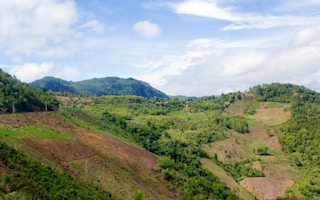A recent ban on the export of raw logs imposed by the Lao government to increase the value of processed wood products is not being enforced in the country’s southern provinces because some national leaders are involved in timber smuggling, a civil society official with knowledge of the situation said.
Although Vientiane imposed the export ban on Aug. 18, hundreds of trucks in Champasak, Salavan, Sekong and Attapue provinces, which have more timber than do the northern provinces, are continuing to transport wood to neighboring Vietnam around the clock, the official, who requested anonymity, and locals told RFA’s Lao Service.
“This means the announcement cannot be implemented for enforcement because people and relevant officials know well that those who are behind the log smuggling are some national leaders,” said the civil society leader who requested anonymity.
“Since May, I have seen many hundreds of trucks transporting logs to Vietnam,” he said. “This is a part of what I see, but it does not include the number of trucks that I do not see.”
But Khaenthong Sisouvong, deputy governor of Attapue province, who is in charge of forest management, told RFA that his province has implemented the ban to control timber exports and manage forest resources according to the rule of law and through cooperation with districts and villages.
“In the province, we have suspended cutting logs since May,” he said. “The logs which we have are left from last season, and now we are promoting wood processing in order to add more value to wood products before exporting them.”
Officials seized and destroyed hundreds of electric saws last week in Vientiane province in central Laos, because they said they were used to illegally cut timber.
“The officials just implement the law against villagers who have cut the logs to build their houses, but they do not do anything to the big log smugglers who are destroying Laos’ forest,” the civil society official said.
Officials are now implementing the ban to control and manage log exports and have suspended the felling of trees in forest areas, he said.
Deforestation has been a major problem in the last two decades for Laos, whose forests cover less than 40 percent of the country’s land, according to the Lao Ministry of Natural Resources and the Environment.
Laos’ forest sector has shifted away from the export of mainly unfinished wood products to managed plantations and export-based forest production, according to a report issued last October by the London-based NGO Chatham House, with logs shipped primarily to Vietnam, Thailand and China, often through illegal sales.
“The forest in Laos will be gone in the near future, and it will be impossible for the Lao government to increase forest coverage to 70 percent by 2020, according to the national forest strategy,” the civil society official said.
Crackdown not enough
The Lao government has taken some measures to crack down on prevalent illegal logging in the country, but serious implementation and enforcement challenges remain, the Chatham House report said.
it also said the country’s legal framework with regard to the forest sector is unclear and at times contradictory, implementation by the central and local governments is inconsistent, and enforcement capacity is weak.
International NGOS have worked with the Laos government to make changes to the country’s forest sector policies that would close loopholes to prevent high-ranking politicians from being involved in the illegal timber trade.
But while the proposals have been debated in parliament, they have yet to make it through the legislature to be included in the relevant law.
Southern Laos has been hotbed of illegal logging exports in recent months.
Illegal logging in Champasak province was particularly devastating for forests in July, when a businessmen working in cahoots with high-ranking officials felled a significant number of trees before the start of the rainy season, according to a local police officer, who spoke to RFA on condition of anonymity.
Trucks with both Lao and Vietnamese registrations had transported legal and illegal loads of timber throughout central and southern Laos en route to Vietnam, he said.
In June, loggers in the southernmost province of Attapeu bundled illegally harvested timber outside the boundaries of designated concession areas and mixed it with wood which had been legally collected to sell to buyers in Vietnam, a source close to a central government official’s family told RFA.
The son-in-law of a national leader, who is in charge of granting permits in the province, runs a company which has been logging the timber, he said.
In the northern part of the country, luxury rosewood continued to be smuggled across the border to China by family members of Laos’ elite with the help of local authorities who were paid bribes, sources with knowledge of the network told RFA in June.
Copyright © 1998-2014, RFA. Used with the permission of Radio Free Asia, 2025 M St. NW, Suite 300, Washington DC 20036.










